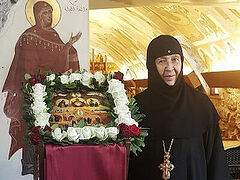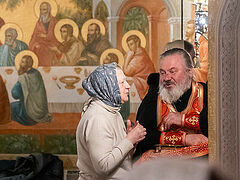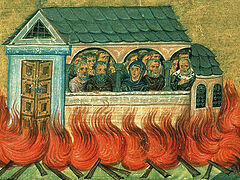It’s important to make a decision and say that pain is meaning, value, Christ, friendship, virtue, and reverence, for which I’m ready to experience pain. I have to find this pain in order to embrace it. This is the cross I’ll embrace in order for the resurrection to come.
Secondly, I have to focus on this, not reject the difficulties that have arisen, not reject this fight because I have no desire to fight, because I don’t feel ready to fight at this stage of my life.
One Athonite elder told me:
There will be moments in your life when you’ll have a lot of grace—joy, blessing, tenderness, the desire to pray, to go to church, to read Patristic and spiritual books. And there will also be moments when you have no desire for any of this; you’ll be overcome by despondency, indifference, apathy; you won’t even feel like talking. But be careful even then not to cancel your meeting with God—don’t cancel it. During the day, schedule a meeting with God, which will consist of reading spiritual books, of praying on your prayer rope, reading Compline, the Akathist. I don’t know how your meeting with God will take place, but go to church. And when you don’t feel so good, keep going to church. And just sit there, or kneel, and tell God: “I feel like a rag! I have neither the strength nor the desire to tell You anything!”
But do it, and the words you say to God will be transformed into prayer.
One day, a woman went to see Elder Sophrony (Sakharov), that great saint, and he asked her: “What happened to you? I haven’t seen you in the monastery for a long time.”
“I didn’t have any particular desire to come to the monastery, because I fight with God more than I glorify Him. I have some major issues about Him.”
“Don’t worry, come and tell Him about it! Let it all out; tell Him how you feel, share all of this with Him; make it an occasion for communion with God.”
What is the Psalter? Half of the Psalter is doxology and thanksgiving, and the other half is fighting and battling with God. David says to Him:
“Where are You? You’re not here! My enemies persecute me; I’m drowning, I’m dying, and You’re not here—You’re doing nothing. You’ve abandoned me and my enemies persecute me, conspire against me, and slander me.”
Elder Sophrony says that his prayer often takes on the characteristics of a battle, a dispute with God. He also says:
I often turn into a God-fighter. I fight and battle with Him, but that’s my relationship with Him. In a real relationship, I have to learn to say, “No!” and also to hear, “No!” from the other person. In a real relationship, I talk about the things that irritate and bother me. I tell the other person: “I’m not well!” Real relationships have changes and fluctuations. In a real relationship, a person changes, transforms, quarrels, reconciles. Are there any normal relationships without tension? No. Unless it’s just pain.
One time, a woman was telling me about her husband:
Father, I’ve never seen my husband laugh. Throughout our entire life together, he’s hardly ever laughed. We’re old now. Then one day, when we were sitting in the living room, I saw him smiling at me, and I said, “Thank God!”
I was delighted. A miracle! Half a minute passed, and he was still smiling. Then another half a minute, and my husband kept smiling. Then I realized he had had a stroke.
Another woman came and told me: “I can’t stand my husband anymore!”
“Why? Is he aggressive?”
“No, he’s not aggressive at all.”
“Does he yell at you?”
“No.”
“Does he leave home? Does he come home late from work? Is he addicted to gambling?”
“No, no!”
“You have an ideal husband.”
“I can’t stand him!”
“Why?”
“Because, Father, if you tell him to sit down, he sits down! If you tell him to go and eat something, he goes and eats something. I’m gone all day, walking around the city, and when I come home, he says to me, ‘Welcome home! How are you?’ I go out with some friends, we go to a bar, and I come home late, sometimes not till midnight, and I ask myself, ‘What will he say now?’ And he asks me, ‘Darling, did you have a good time with your friends?’”
“And you don’t like that?”
“No, Father, I don’t! I’d like him to be a little different, for him to get angry, or a little jealous of me. I want to feel desired, to feel loved. That’s what I want!”
 And it’s torment. Just as it’s a torment when someone yells at you and scolds you, so is this. Too much calm makes you uneasy. You can’t endure so much calm. If we turn to the spiritual sphere, then our relationship with God should pulsate, and we shouldn’t be afraid of it; everything should become prayer, even in these difficult moments.
And it’s torment. Just as it’s a torment when someone yells at you and scolds you, so is this. Too much calm makes you uneasy. You can’t endure so much calm. If we turn to the spiritual sphere, then our relationship with God should pulsate, and we shouldn’t be afraid of it; everything should become prayer, even in these difficult moments.
Another element is what we will focus on to bear this pain, that is, what we will dedicate ourselves to. That means that if I go to Katerini five or ten times, but stay there for one night then leave, I’ll never get to know the city. To get to know Katerini, you have to stay there, not for one night to have a good time and leave, but longer, to feel the cold and endure the city’s cold nights, and to feel the difficult moments in Katerini in general. Only then will you get acquainted with it and be able to say that you’ve gotten to know Katerini. In the same way, to reach my goal, I have to dedicate myself to God. I have to dedicate myself to God, to man, to love, marriage, whatever—I can’t just wait for happy moments with my spouse, but rather I should endure their silence and the difficulties they create.
When someone would go to Simonopetra Monastery wanting to become a monk, the reposed venerable Elder Aimilianos, seeing and appreciating his enthusiasm, his zeal for prayer, prostrations, Church services, and fasting, would say:
Good, that’s all blessed! Very good. But I also want to see how you behave with other monks, to see how you live here inside the monastery, to see how you relate to someone who won’t smile at you every day. There will come a day when he won’t be in a good mood, like you. Because here in the monastery you’re called to manifest Christ, humility, patience.
We want a lot, but we’re not ready to give a lot. We read a spiritual book, we see the experience of the saints, and we want to try it too, but we don’t want to bear the ascetic cross that they bore. We admire their lives and we talk about how holy St. Paisios was—but who wants to live the life of St. Paisios? Who? We only want the result, the fruit, but this fruit doesn’t come so easily. How much holiness did St. Porphyrios have, what gifts of grace did he have? Yes, but if you want to have the gifts of grace of St. Porphyrios, then take his whole “package”—his sicknesses, problems, loneliness, and everything he endured in his life. You can’t pick and choose. Many people want to have an amazing body, but they don’t want to go to the gym.
One friend told me:
“I signed up for the gym.”
“That’s good, but you look the same to me.”
“What, am I supposed to go to the gym, too?”
No, stay at home, do nothing, and lose weight!
We want to make a profit, but with little or no work. We want recognition, but we don’t want any responsibilities.
We want to have a very good relationship with our wife, have a very good life, but we don’t want the rest; we don’t want to hear her objections, when she says, “That’s it, I can’t listen to you anymore!”
Well, hold on, how’s that going to happen? You can’t mock her all day, humiliate her, put her on the back burner, and then want to have a good life with her. It doesn’t work that way. You have to put up with her silence, too. You have to be ready to enter another person’s world, to bear their difficulties.
“But, Father, am I supposed to play the role of a psychologist for my wife?” says the husband.
Yes, you will play the role of psychologist. You can’t just want to take and not be ready to give anything at all and not devote yourself to your other half at all. And, of course, we want God’s grace, without having the necessary asceticism.
At the end of one of our talks, there was time for questions. One man jumped up like a spring and said: “Father, one question has been tormenting me the whole time you’ve been talking!”
“Great!” I said to myself. “I provoked him. If he was tormented by this question for that long, it means I have sown a good seed in him.”
He continued: “Father, I want to ask you: Since you’re from Crete, how much does olive oil cost there?”
“I see…!” I said to myself.





